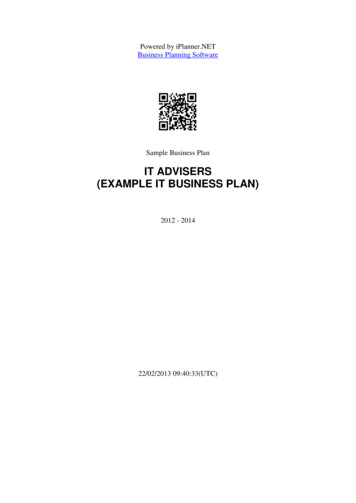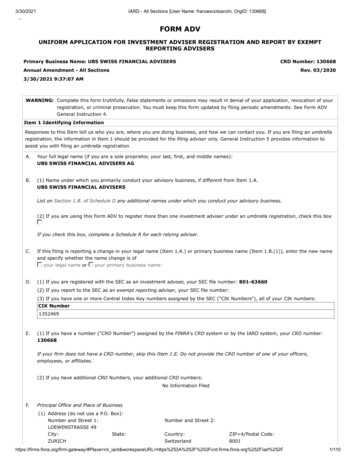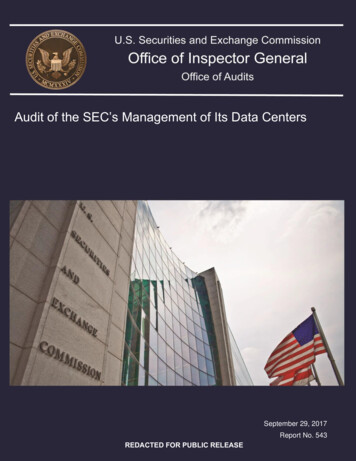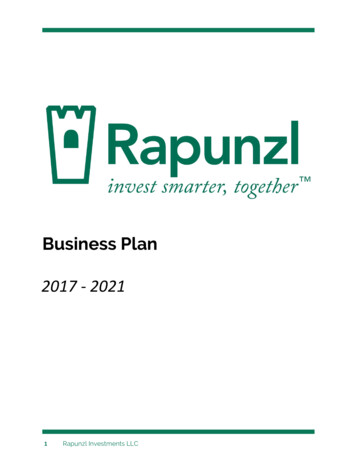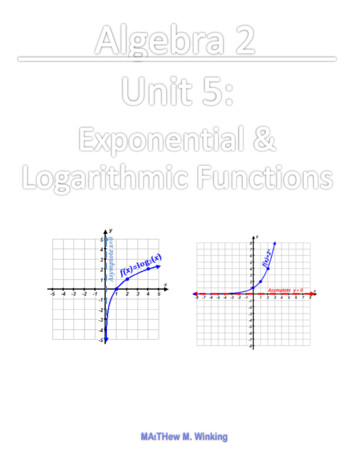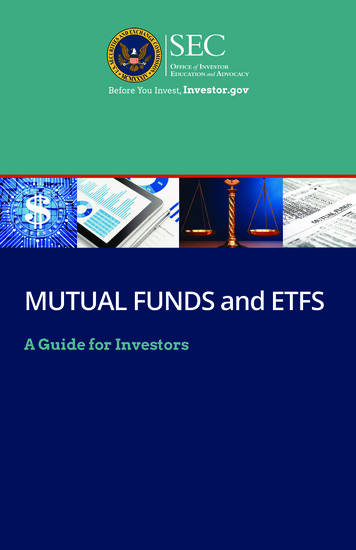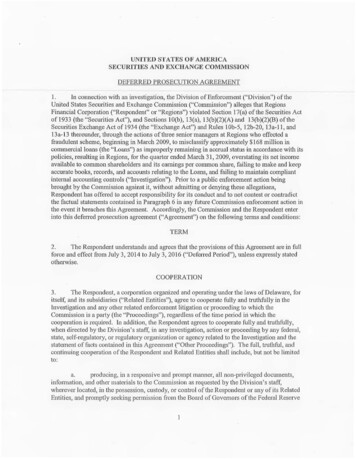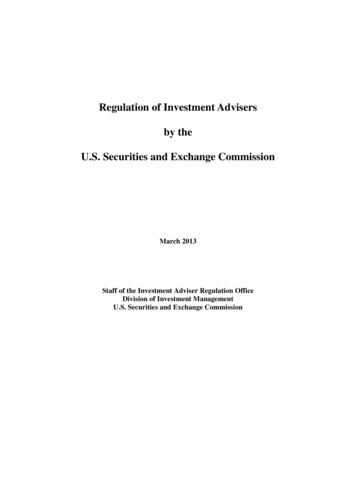
Transcription
Regulation of Investment Advisersby theU.S. Securities and Exchange CommissionMarch 2013Staff of the Investment Adviser Regulation OfficeDivision of Investment ManagementU.S. Securities and Exchange Commission
Regulation of Investment Advisers by theU.S. Securities and Exchange Commission *I.IntroductionMoney managers, investment consultants, and financial planners are regulated in theUnited States as “investment advisers” under the U.S. Investment Advisers Act of 1940(“Advisers Act” or “Act”) or similar state statutes. This outline describes the regulationof investment advisers by the U.S. Securities and Exchange Commission (“SEC”).The Advisers Act is the last in a series of federal statutes intended to eliminate abuses inthe securities industry that Congress believed contributed to the stock market crash of1929 and the depression of the 1930s. The Act is based on a congressionally-mandatedstudy of investment companies, including consideration of investment counsel andinvestment advisory services, carried out by the SEC during the 1930s. 1 The SEC’sreport traced the history and growth of investment advisers and reflected the positionthat investment advisers could not properly perform their function unless all conflicts ofinterest between them and their clients were removed. The report stressed that asignificant problem in the industry was the existence, either consciously or, more likely,unconsciously, of a prejudice by advisers in favor of their own financial interests.The SEC’s report culminated in the introduction of a bill that, with some changes,became the Advisers Act. The Act, as adopted, reflects congressional recognition of thedelicate fiduciary nature of the advisory relationship, as well as Congress’ desire toeliminate, or at least expose, all conflicts of interest that might cause advisers, eitherconsciously or unconsciously, to render advice that is not disinterested. 2The outline that follows is divided into five sections, each of which addresses adifferent question: Who is an “investment adviser?” Which investment advisers mustregister with the SEC? Who must register under the Act? How does an investmentadviser register under the Act? What are the requirements applicable to an investmentadviser registered under the Act?*The U.S. Securities and Exchange Commission, as a matter of policy, disclaims responsibility for anyprivate publication or statement by any of its employees. The views expressed in this outline are thoseof the staff of the Investment Adviser Regulation Office, and do not necessarily reflect the views of theU.S. Securities and Exchange Commission or others on the staff of the U.S. Securities and ExchangeCommission. The Investment Adviser Regulation Office would like to thank Robert E. Plaze, theoriginal author of this outline, for his substantial contribution.1See Investment Trusts and Investment Companies, Report of the Securities and Exchange Commission,Pursuant to Section 30 of the Public Utility Holding Company Act of 1935, on Investment Counsel,Investment Management, Investment Supervisory and Investment Advisory Services, H.R. Doc. No.477, 76th Cong., 2d Sess. (1939).2SEC v. Capital Gains Research Bureau, Inc., 375 U.S. 180, 189, 191-192 (1963).1
II.Who is an Investment Adviser?A.Definition of Investment AdviserSection 202(a)(11) of the Act defines an investment adviser as any person or firmthat: for compensation;is engaged in the business of;providing advice to others or issuing reports or analyses regarding securities.A person must satisfy all three elements to fall within the definition of“investment adviser,” which the SEC staff has addressed in an extensiveinterpretive release explaining how the Act applies to financial planners, pensionconsultants and other persons who, as a part of some other financially relatedservices, provide investment advice. 3 Published in 1987, Investment Advisers ActRelease No. 1092 represents the views of the Division of InvestmentManagement, which is primarily responsible for administering the Act.1.Compensation. The term “compensation” has been broadly construed.Generally, the receipt of any economic benefit, whether in the form of anadvisory fee, some other fee relating to the total services rendered, acommission, or some combination, satisfies this element. 4 The personreceiving the advice or another person may pay the compensation.2.Engaged in the Business. A person must be engaged in the business ofproviding advice. This does not have to be the sole or even the primaryactivity of the person. Factors used to evaluate whether a person is engagedare: (i) whether the person holds himself out as an investment adviser; (ii)whether the person receives compensation that represents a clearly definablecharge for providing investment advice; and (iii) the frequency andspecificity of the investment advice provided. 5 Generally, a personproviding advice about specific securities will be “engaged in the business”unless specific advice is rendered only on a rare or isolated occasion. 63Applicability of the Investment Advisers Act of 1940 to Financial Planners, Pension Consultants, andOther Persons Who Provide Others with Investment Advice as a Component of Other FinancialServices, Investment Advisers Act Release No. 1092 (Oct. 8, 1987) (“Release 1092”).4Id.; see also Kenisa Oil Company, SEC Staff No-Action Letter (May 6, 1982); SEC v. Fife, 311 F. 3d1 (1st Cir. 2002) (a person provides advice “for compensation” if it understands that successfulinvestment will yield it a commission); In the Matter of Alexander V. Stein, Investment Advisers ActRelease. No. 1497 (June 8, 1995) (a person receives “compensation” if it fraudulently converts clientfunds to its own use).5Zinn v. Parish, 644 F.2d 360 (7th Cir. 1981); Release 1092, supra note 3.6For instance, the SEC staff would not view an employer providing advice to an employee in connectionwith an employer-sponsored employee benefit program to be in the business of providing advice, seeLetter to Olena Berg, Assistant Secretary, Department of Labor, from Jack W. Murphy, Chief Counsel,Division of Investment Management, SEC (Feb. 22, 1996). See also Zinn, supra note 5 at 364(“isolated transactions with a client as an incident to the main purpose of his management contract tonegotiate football contracts do not constitute engaging in the business of advising others on investmentsecurities.”).2
3.Advising Others about Securitiesa.Advice about Securities. A person clearly meets the third element ofthe statutory test if he provides advice to others about specificsecurities, such as stocks, bonds, mutual funds, limited partnerships,and commodity pools. The SEC staff has stated that advice about realestate, coins, precious metals, or commodities is not advice aboutsecurities. 7 The more difficult questions arise with less specificadvice, or advice that is only indirectly about securities. The SEC staffhas stated in this regard:(i)advice about market trends is advice about securities; 8(ii)advice about the selection and retention of other advisers isadvice about securities; 9(iii) advice about the advantages of investing in securities versusother types of investments (e.g., coins or real estate) is adviceabout securities; 10(iv) providing a selective list of securities is advice about securitieseven if no advice is provided as to any one security; 11 and(v)b.asset allocation advice is advice about securities. 12Advising Others. Questions about whether a person advises “others”usually arise when a client is not a natural person. The SEC staffgenerally looks to the substance of the arrangement rather than itsform:(i)A general partner of a limited partnership that provides advicewith respect to the investments of partnership assets is advisingothers (the limited partners) even where the general partner mayhave legal title to these assets. 137Robert R. Champion, SEC Staff No-Action Letter (Sept. 22, 1986).8Dow Theory Forecasts, SEC Staff No-Action Letter (Feb. 2, 1978). Thus, market-timing advice isadvice about securities. See Maratta Advisory, Inc., SEC Staff No-Action Letter (July 16, 1981).9Release 1092, supra note 3; FPC Securities Corp., SEC Staff No-Action Letter (Dec. 1, 1974). Seealso SEC v. Bolla, 401 F.Supp. 43 (D.D.C. 2005), aff’d. in relevant part, SEC v. WashingtonInvestment Network, 475 F.3d 392 (D.C. Cir. 2007) (person selecting investment advisers for clientsmeets the Advisers Act’s definition of “investment adviser”).10Release 1092, supra note 3.11RDM Infodustries, Inc., SEC Staff No-Action Letter (Mar. 25, 1996). The SEC staff takes the positionthat providing information about securities in a report does not constitute providing advice about thesecurities if: (i) the information is readily available to the public in its raw state; (ii) the categories ofinformation presented are not highly selective; and (iii) the information is not organized or presented ina manner that suggests the purchase, holding, or sale of any security. See id.12Maratta Advisory, Inc., supra, note 8. See also SEC v. Bolla, supra, note 9.13Abrahamson v. Fleschner, 566 F.2d 862, 870 (2d Cir. 1977), cert. denied, 436 U.S. 913 (1978); SEC v.Haligiannis, 470 F. Supp. 2d 373, 383 (S.D.N.Y. 2007).3
(ii)B.A wholly-owned corporate subsidiary exclusively advising theparent or another wholly owned corporate subsidiary would notgenerally be considered advising “others.” 14c.Investment Banking. The SEC staff does not believe that the Actapplies to persons whose activities are limited to advising issuersconcerning the structuring of their securities offerings (although suchadvice may technically be about securities). 15d.Non-U.S. Clients. The Act is silent regarding whether the clients mustbe U.S. persons. The SEC takes the position that a U.S. personproviding advice exclusively to non-U.S. persons would still be subjectto the Act. 16Exclusions from DefinitionThere are several exclusions from the investment adviser definition available topersons who presumably (or at least arguably) satisfy all three elements of thedefinition. A person eligible for one of the exclusions is not subject to anyprovisions of the Act.1.Banks and Bank Holding Companies. This exclusion is generally limited toU.S. banks and bank holding companies. 17 The SEC staff has stated that theexclusion is unavailable to non-U.S. banks, 18 credit unions, and investmentadviser subsidiaries of banks or bank holding companies. 192.Lawyers, Accountants, Engineers, and Teachers. The professional exclusionis available only to those professionals listed, and only if the advice given isincidental to the practice of their profession. Factors considered by staff toevaluate whether advice is incidental to a profession are: (i) whether theprofessional holds himself out as an investment adviser; (ii) whether theadvice is reasonably related to the professional services provided; and (iii)whether the charge for advisory services is based on the same factors that14See Zenkyoren Asset Management of America Inc., SEC Staff No-Action Letter (June 30, 2011).15See, e.g., The Applicability of the Investment Advisers Act of 1940 to Financial Advisors to MunicipalBond Issuers, Division of Investment Management, SEC Staff Legal Bulletin No. 11 (Sept. 19, 2000),available at http://www.sec.gov/interps/legal.shtml.16See Release 3221, infra note 46, at n.76.17The term “bank” is defined in section 202(a)(2) of the Act. In 2001, the Act’s definition of“investment adviser” was amended so that banks and bank holding companies are not eligible for thisexclusion to the extent that they serve or act as an investment adviser to a registered investmentcompany. However, if, in the case of a bank, such services or actions are performed through aseparately identifiable department or division, the department or division, and not the bank itself, isdeemed to be the investment adviser. The term “separately identifiable department or division” isdefined in section 202(a)(26).18Letter to Rep. William J. Hughes from Stanley B. Judd, Deputy Chief Counsel, Division of InvestmentManagement, SEC (June 4, 1980).19First Commerce Investors, Inc., SEC Staff No-Action Letter (Jan. 31, 1991); Southwest CorporateFederal Credit Union, SEC Staff No-Action Letter (May 31, 1983).4
determine the professional’s usual charge. 203.Brokers and Dealers. A broker or dealer that is registered with the SECunder the Securities and Exchange Act of 1934 (“Exchange Act”) isexcluded from the Act if the advice given is: (i) solely incidental to theconduct of its business as broker or dealer, and (ii) it does not receive any“special compensation” for providing investment advice.a.Solely Incidental. The SEC has stated that investment advice is “solelyincidental” to brokerage services when the advisory services renderedare “in connection with and reasonably related to the brokerageservices provided.” 21 If advice is not “solely incidental,” a brokerdealer is subject to the Advisers Act regardless of the form ofcompensation it receives.b.Special Compensation. Generally, to avoid receiving “specialcompensation,” a broker or dealer relying on this exclusion mustreceive only commissions, markups, and markdowns. 22Bundled Fees. The SEC has stated a broker or dealer that receives afee based on a percentage of assets that compensates the broker ordealer for both advisory and brokerage services receives “specialcompensation.” 23Separate or Identifiable Charge. The SEC has stated that a brokerdealer charges “special compensation” when it charges its customer aseparate fee for investment advice, or when it charges its customersdifferent commission rates, one with advice and one without, becausethe difference represents a clearly definable charge for investmentadvice. 24Broker-Dealer Agents. The SEC staff has stated that a registeredrepresentative of a broker-dealer can rely on the exclusion if she is: (i)giving advice within the scope of her employment with the broker-20Release 1092, supra note 3; Henry S. Miller Companies of Dallas, Texas, SEC Staff No-Action Letter(Feb. 21, 1975).21Certain Broker-Dealers Deemed Not To Be Investment Advisers, Investment Advisers Act Release No.2376 (Apr. 12, 2005) (“Release 2376”), available at ion 202(a)(11)(C). See S. Rep. No. 76-1775 at 22; H.R. Rep. No. 76-2639 at 28 (the term“investment adviser” was “so defined as specifically to exclude . . . brokers (insofar as their advice ismerely incidental to brokerage transactions for which they receive only brokerage commissions.”)).23In Release 2376, the SEC adopted a rule that, among other things, deemed brokers charging assetbased brokerage fees (rather than commissions, mark-ups, or mark-downs) not to be investmentadvisers based solely on their receipt of special compensation. The rule was vacated for other reasonsby a federal court in March 2007. Financial Planning Association v. SEC, 482 F.3d (D.C. Cir. 2007).See also National Regulatory Services, SEC Staff No-Action Letter (Dec 2, 1992) at n.3.24Final Extension of Temporary Exemption from the Investment Advisers Act for Certain Brokers andDealers, Investment Advisers Act Release No. 626 (Apr. 27, 1978) (“Release 626”). See also, Opinionof the General Counsel Relating to Section 203(b)(3)of the Investment Advisers Act of 1940,Investment Advisers Act No. 2 (Oct. 28, 1940). The Commission proposed to codify thisinterpretation in a rule. See Interpretive Rule under the Advisers Act Affecting Broker-Dealers,Investment Advisers Act Release No. 2652 (Sept. 24, 2007).5
dealer; (ii) the advice is incidental to her employer’s brokerageactivities; and (iii) she receives no special compensation for heradvice. 25Brokerage Customers. The SEC has stated that a broker-dealer doesnot have to treat its brokerage customers to whom it providesinvestment advice as advisory clients simply because it is registeredunder the Advisers Act. It must treat as an advisory client only thoseaccounts for which it provides advice (i.e., non-incidental advice) orreceives compensation (i.e., special compensation) that subjects thebroker-dealer to the Advisers Act. 264.Publishers. Publishers are excluded from the Act, but only if a publication:(i) provides only impersonal advice (i.e., advice not tailored to the individualneeds of a specific client); 27 (ii) is “bona fide,” (containing disinterestedcommentary and analysis rather than promotional material disseminated bysomeone touting particular securities); and (iii) is of general and regularcirculation (rather than issued from time to time in response to episodicmarket activity). 285.Government Securities Advisers. This exclusion is available to persons andfirms whose advice is limited to certain securities issued by or guaranteed bythe U.S. government. 296.Credit Rating Agencies. This exclusion is available to any rating agencyregulated under section 15E of the Exchange Act as a “nationally recognizedstatistical rating organization.” 3025Institute of Certified Financial Planners, SEC Staff No-Action Letter (Jan. 21, 1986).26Release 626, supra note 24. The Commission has proposed to codify this interpretation in a rule. SeeInterpretive Rule under the Advisers Act Affecting Broker-Dealers, supra note 24.27See Weiss Research, Inc., et al, Investment Advisers Act Release No. 2525 (June 22, 2006) (newsletterpublisher deemed to be an investment adviser providing personalized investment advice whose “autotrading” program sent signals to broker-dealer, which automatically traded subscriber/customersecurities consistent with signals).28Section 202(a)(11)(D). See Lowe v. SEC, 472 U.S. 181 (1985); SEC v. Gun Soo Oh Park, A/K/A TokyoJoe, and Tokyo Joe’s Societe Anonyme Corp., 99 F. Supp. 2d 889 (N.D. Ill. 2000). If a publisher isrequired to register as a result of some other advisory activity, the adviser is subject to all of theprovisions of the Act and SEC rules with respect to the publication. See Investment Advisers ActRelease No. 870 (July 15, 1983)(“Release 870”).29Section 202(a)(11)(E). The scope of the exception includes persons whose advice is limited to:(i) direct obligations of the Federal government (e.g., U.S. Treasury obligations); (ii) securities subjectto guarantees from the Federal government; and (iii) securities issued by or guaranteed by corporationswhose securities are designated by the Secretary of the Treasury as exempt from the Exchange Act.The SEC staff has stated that advice about repurchase agreements collateralized by U.S. governmentsecurities does not fall within the exception. J.Y. Barry Arbitrage Management, Inc., SEC Staff NoAction Letter (Oct. 18, 1989). See also In the Matter of Rauscher Pierce Refsnes, Inc., et al.,Investment Advisers Act Release No. 1863 (Apr. 6, 2000) (“Because Rauscher’s advice was notlimited to Treasury securities or other government securities as described in section 202(a)(11)(E), thatprovision did not operate to exclude Rauscher from the definition of investment adviser.”).30Section 202(a)(11)(F), containing this exclusion for rating agencies, was added to the Act by the CreditRating Agency Reform Act of 2006. Pub. L. No. 109-291, 120 Stat. 1327 (Sept. 29, 2006).6
7.Family Offices. A family office that manages the wealth and other affairs ofa single family is excluded from the investment adviser definition if it: (i)provides investment advice only to family clients; (ii) is wholly owned byfamily clients and exclusively controlled by family members and/or certainfamily entities; and (iii) does not hold itself out 31 to the public as aninvestment adviser. 32a.Family Members. A family office’s “family members” include alllineal descendants (including adopted children, stepchildren, fosterchildren, and, in some cases, persons who were minors when a familymember became their legal guardian) of a common ancestor (no morethan 10 generations removed from the youngest generation of familymember
The Applicability of the Investment Advisers Act of 1940 to Financial Advisors to Municipal Bond Issuers, Division of Investment Management , S
